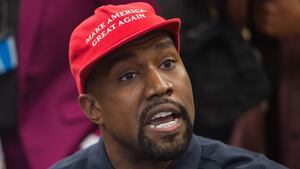It’s Thursday, November 4th at 10:32 a.m. ET. The Democrats have all but lost the Senate, the GOP is gaining on the House, a handful of states teeter on the thin line between red and blue. President Trump has barricaded himself in the White House, then declared victory, then been flagged by social media moderators for spreading disinformation. Pollsters are having a glass of wine or whatever and chilling out. But one Gap PR team has the tweet to bridge the divide once and for all. They’ve grafted two sweatshirts together—one red, one blue—for a reconciliatory GIF. “The one thing we know,” @Gap tweets, “is that together, we can move forward.💙❤️”

The tweet was gone within two hours, and not just because the zippered “A” was wildly out of alignment. In the middle of an election that could decide whether the 8 million Americans who recently entered poverty will see a stimulus bill this century, some of the video’s 700,000 viewers weren’t keen on a merch drop, roundly mocking the post on Twitter. “The intention of our social media post, that featured a red and blue hoodie, was to show the power of unity,” a Gap spokesperson told The New York Times. “It was just too soon for this message. We remain optimistic that our country will come together to drive positive change for all.”
Gap’s blunder stood out, but it was not an isolated incident. The tweet arrived after weeks of brand promotions and commercials packaging toothless calls for civic engagement alongside well-lit product placement. “Get a free day to perform your civic duty when you book 2+ days from one of our neighborhood locations,” one Hertz rental car promotion read. “Drink Responsibly, #VoteResponsibly.” tweeted Absolut Vodka. Streaming services plastered “VOTE” stickers on the albums of artists from Alice Cooper to Peter, Paul, and Mary. On Election Eve, Adidas told customers in a promo email that “the biggest drop is tomorrow.” They meant their limited edition apparel.
Perhaps the most deranged iteration emerged from milk’s favorite dairy-free cookie: Oreo. Days before polls closed, the Nabisco brand dropped a 30-second animation featuring a deep-fried Oreo stand and three sentient plush toys—a donkey, an elephant, and a crying cat. “As they try to help the cat get some milk and Oreos, the symbolic political rivals end up getting into a tiff, forgetting about the task at hand,” AdWeek wrote in a glowing review. “After seeing the feline’s distress, they ultimately manage to put their differences aside, and the three of them enjoy some milk and Oreo cookies together.”
The commercial, produced by advertising firm The Martin Agency, was billed as a “modern-day fable about how two rivals [who] realize that, while they might be divided by their differences, they can still find joy in working together to make a positive impact.” But perhaps, like Gap’s, the message came too soon. When the company tweeted a version on election day—“Life’s sweeter when we come together #Oreo”—it was deleted within hours. The ad drew criticism even within its own industry. Senior Director of Brand at Bonobos John Jannuzzi, who also runs a cookie company (his bio reads: “Jannuzzi’s Cookies drop every Sunday @ 8pm ET!”), shared a screenshot in response to the Gap ad. “Oreo did this with their attempt too,” Jannuzzi wrote on Twitter, “it’s like r u guys alive.”

The vulgarity of corporate election promos lies not merely with the inopportune timing or the coy refusal to take any stance on the policies that shape American lives, but a failure to grapple with brands’ roles in perpetuating the same ills their ads claim to cure. Thursday morning, for example, the sandwich shop Potbelly tweeted the following:

Potbelly didn’t feel that way six months ago when, in the early weeks of the pandemic, the company applied for and received a $10 million loan from the Paycheck Protection Program—the stimulus plan intended to support small businesses during lockdown. The eatery, which has a $71.2 million market cap, accepted the maximum loan amount, before outrage pushed them to return the money. Maybe for similar reasons, they later deleted their tweet.
But at least one election sponsor was somewhat funny. CNN’s Key Race Alert? Sponsored by Calm.


